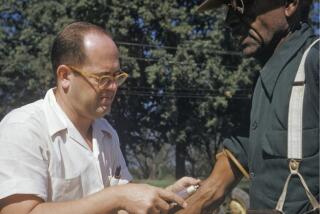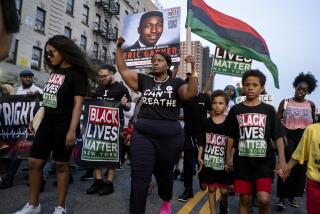Survey of black youths finds ambivalence on society
- Share via
CHICAGO — Many young black people remain alienated and pessimistic about their place in society, with a majority saying immigrants receive better treatment than they do, according to a national survey released Thursday.
Yet the University of Chicago study shows that an overwhelming majority of those young people believe they can make a difference by participating in politics.
High numbers of black youth listen to rap music every day. But most feel it is too violent, offensive to black women and not political enough, the survey found.
The survey, which tracked the attitudes of nearly 1,600 people ages 15 through 25 of all races, is one of the most comprehensive ever to focus on young African Americans.
“We’ve heard a lot about what politicians and others think about this demographic group, but we wanted to give young people a chance to speak for themselves,” said Cathy Cohen, a professor of political science at the University of Chicago, who led the Black Youth Project.
The survey shows that young African Americans are more conservative than their white counterparts when it comes to same-sex marriage and abortion.
Among other findings: More than two-thirds of black youths believe AIDS would be cured faster if more white people had the disease. More African American teens report using condoms or other birth control than white or Latino youth.
“It knocks out a lot of suspicions of how young black people think,” said Lauren Guy, 24, a part-time substitute teacher in the Forest Park School District who responded to the survey. “I think black youth have a lot to say but they don’t get asked.”
The survey was geared toward black attitudes and used a random sample of young people of various backgrounds: 635 blacks, 567 whites, 314 Latinos and 74 of other races.
The interviews were conducted in the summer and fall of 2005. About 40 participants were interviewed at length in 2006.
In many ways, the attitudes of black youths reflect previous generations.
Most doubt the nation’s leaders care about them. They have little faith that racism will end in their lifetime and feel it hinders their advancement. They see police as biased against blacks.
“Their feelings are very much in character with their parents’,” said Michael Dawson, a professor of political science and director of the Center for the Study of Race, Politics and Culture at the University of Chicago. He did not participate in administering the study but is aware of the results.
“You’re hearing a lot of the same themes that troubled people for a long time,” he said.
In the in-depth interviews, questioners sought to understand sometimes contradictory-seeming responses from black youths.
Although opposed to the Iraq war, many said they willingly would serve in the armed forces. While expressing dissatisfaction with the political process, they still believe they can make a difference politically. Voicing opposition to discrimination against gays, they nonetheless do not endorse the gay lifestyle. Black youths were more likely to decry abortion, but most did not support making it illegal. And despite responding to many questions with pessimism, they remain optimistic that their lives can make a difference.
“They really want to contribute,” said Laurence Ralph, a graduate student at the University of Chicago who helped conduct in-depth interviews. “But they feel blocked from the process on many levels.”
Those interviewed were especially searing on education, healthcare and a lack of good jobs for blacks, researchers said.
About half the blacks characterized their schooling as poorer than whites’. A majority of them reported receiving healthcare from public clinics rather than private doctors.
As for sex education, young people across racial lines found high school classes on the subject inadequate. They asked for more comprehensive sex training beyond abstinence, and most wanted condoms distributed in schools.
“The results are red flags and provide talking points for public policymakers,” Cohen said. “Hopefully this survey will make them listen.”
More to Read
Sign up for Essential California
The most important California stories and recommendations in your inbox every morning.
You may occasionally receive promotional content from the Los Angeles Times.













